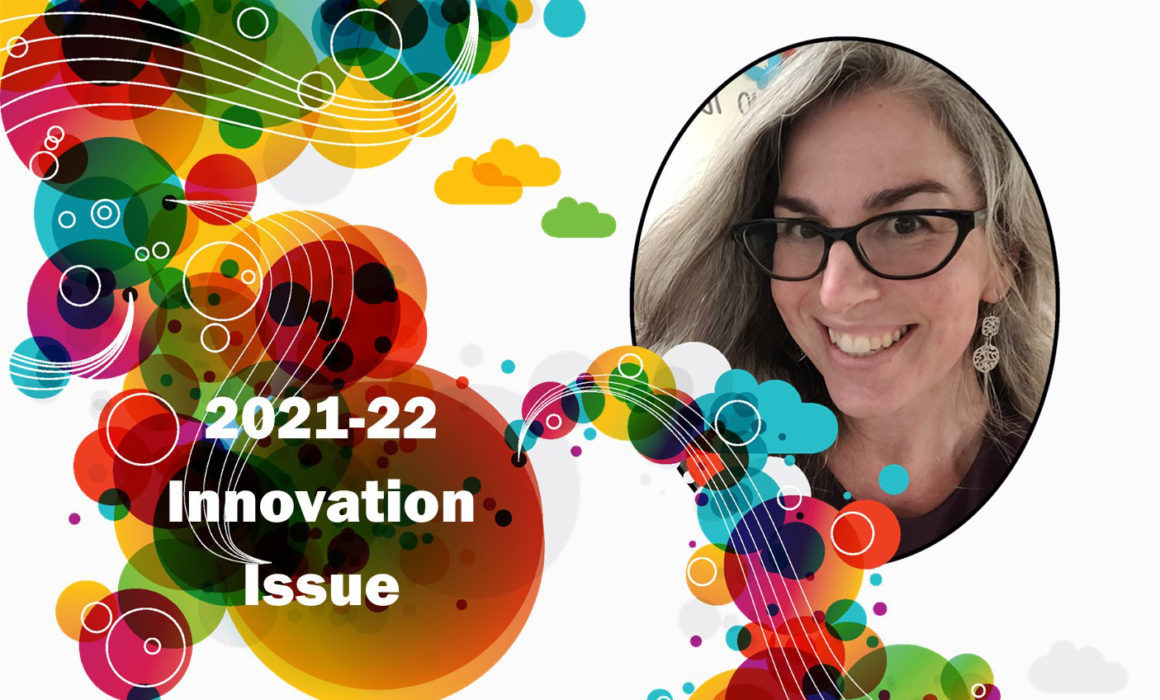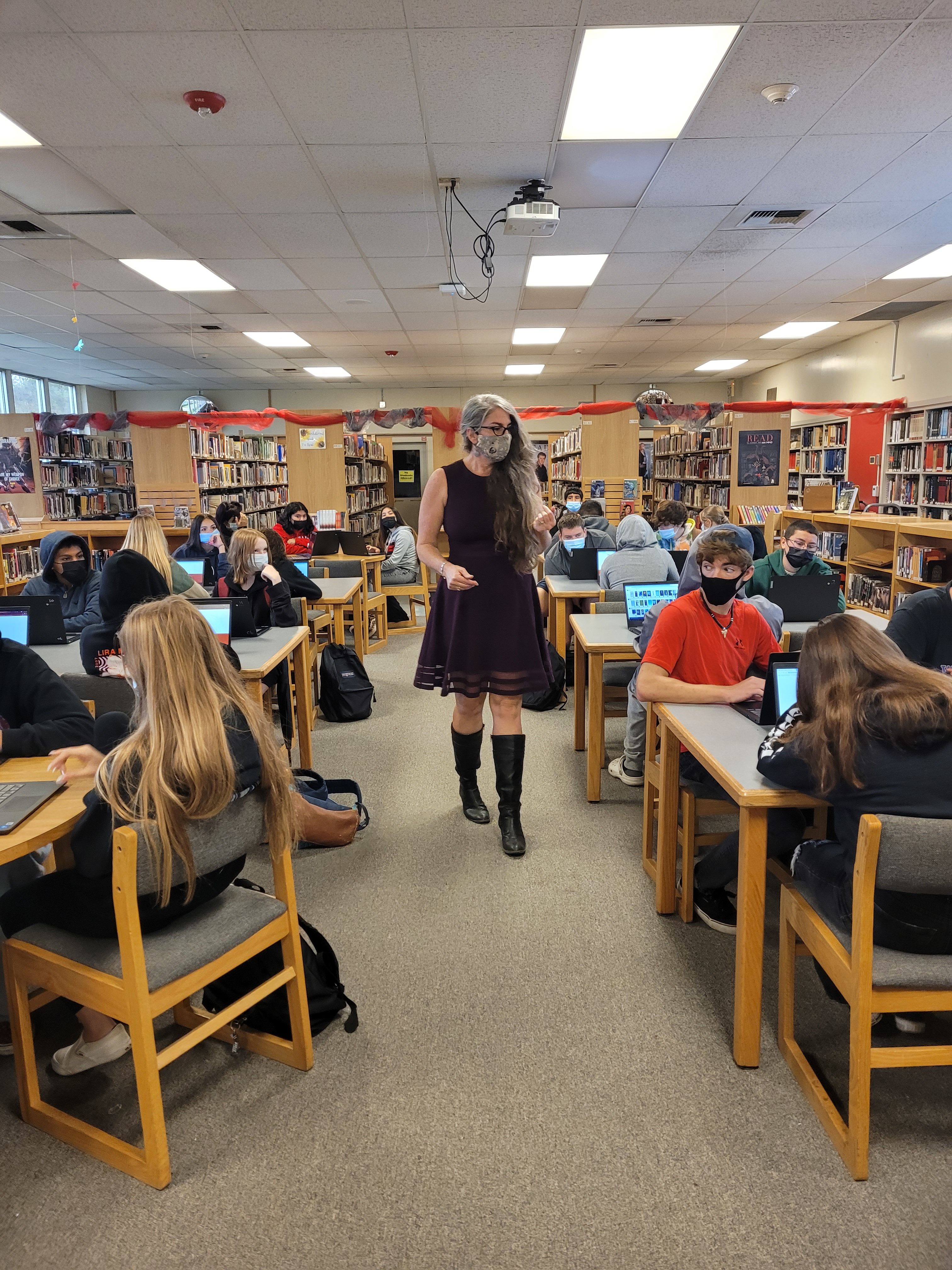
Our 2021-22 Innovation Issue salutes educators who dare to imagine a world where life is better for their students:
“Putting positive ripples in the world is great. Helping my students put positive ripples in the world is even better.”
Katie McNamara spends her days in North High School’s library in the town of Bakersfield. But the entire school — and world — is her classroom.
McNamara’s mission is to share a wealth of information with students and teachers through technology and, of course, books. Her hope is that through such knowledge they will feel empowered to do great things.
“Empowering educators and students is my driving force,” says McNamara, a teacher librarian and Kern High School Teachers Association member. “Putting positive ripples in the world is great. Helping my students put positive ripples in the world is even better.”
In 2018, McNamara was one of 150 people worldwide — and one of 37 educators in the U.S. and Canada — accepted into the Google Innovator Academy, an intensive program where educators design creative solutions to the world’s challenges in education.
The application required a video of a project. Hers, called “Students Teaching Students,” was inspired by her North High students virtually teaching fourth graders in another city about CoSpaces, a coding program that lets users create virtual interactive worlds.
“My students were nervous at first,” she recalls. “But they saw that the fourth graders were so excited that they, too, lit up. The younger students had to create a virtual setting for the theme of a book they were reading. It was a great experience for all.”

McNamara on the move in the North High library.
An active Twitter user, McNamara connects with educators around the world and shares what she learns with those on her own campus.
“Through Twitter, I have a pulse on new things that are happening, and I can dissect what is valuable and bring it back to teachers and students, [especially] things that makes our jobs easier and better.”
One of those things is Wakelet, a platform where teachers and students can save links, social media posts, videos and images that can be organized later into private or public collections. Users can add notes to items to tell a story, ask questions, or give directions.
“I have been encouraging Wakelet in the library and asking students to use it to research wellness information that can improve their own lives,” says McNamara. “It was exciting to see the students create action plans to improve their own mental and physical health through research.”
McNamara believes students should have a voice and connects them to venues where they can be heard. She helped teens become student ambassadors for the Wakelet program and for Telosity, a company working to improve mental health in young people.
She connected 12th grader Damien Cebreros with Steve Isacs, education program manager for Epic Games, so that her student could voice his strong opinions about e-sports industry regulations he would like to see changed.
“Miss Mac is one of best teachers I ever had,” says Cebreros. “She wants to know about our passions — and then gives us the best resources we could possibly have to pursue them.”
McNamara uses her own voice as well, believing that respect and appreciation for school librarians is long overdue. “Our role is crucial in the world of education,” she says.
Among her external roles: She is program director for the teacher librarian credential program at Fresno Pacific University. She presents regularly at national and international conferences, including at a recent Digital Citizenship Institute summit, where she shared her sessions MythBusters-style to help others understand the pillars of digital citizenship. (One of her students spoke at a session on mental health and algorithms.)
“Digital citizenship is not just about being nice online. It’s about being informed, alert, balanced, engaged and inclusive. It’s about being an impactor, instead of just a consumer. The big piece I try to convey to students is by asking: ‘How are you making positive social change in your community — or on a larger scale?’ Digital citizenship is about using technology for good to inspire and empower.”
McNamara is co-chair of the California School Library Association (CSLA) conference in February 2022 and will speak on innovative ways to empower students. She has also organized and served on a CSLA panel about neuro-diverse students.
The subject hits home for her: All her life she has had trouble sitting still; she is constantly moving and changing topics of conversation. When her son began having difficulties in school two years ago, he was diagnosed as having ADHD. And so was she, after more than 40 years.
“My son and I are on this path together,” says McNamara, who grew up in San Bernardino County and was often frustrated in school. “Having ADHD doesn’t mean there is a problem. You just see and experience things differently.”
It turns out that being a teacher librarian — switching from subject to subject and moving around the room to assist students — is a perfect job for someone with ADHD.
“Somehow, I ended up exactly where I needed to be,” says McNamara. “I was meant to be in this library helping these students succeed.”
The Discussion 0 comments Post a Comment